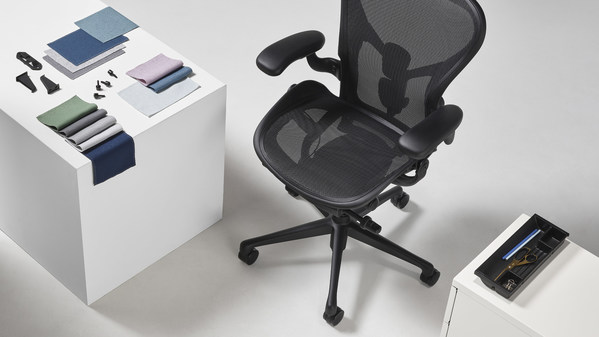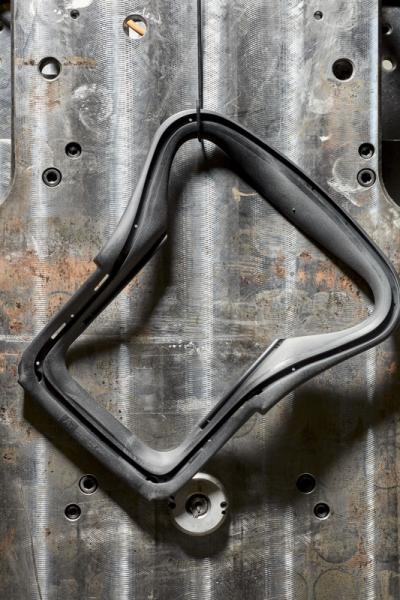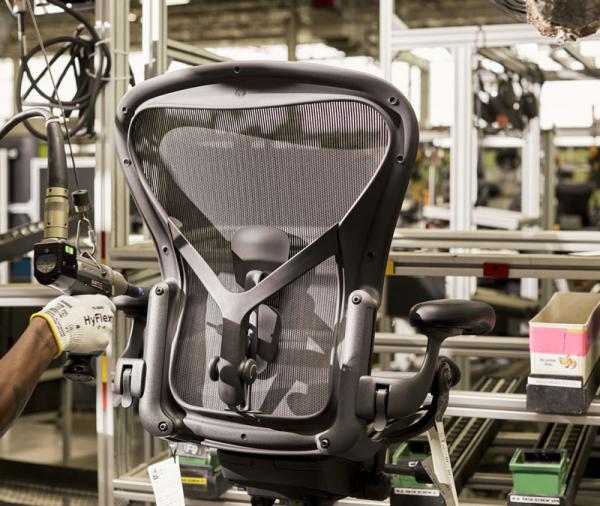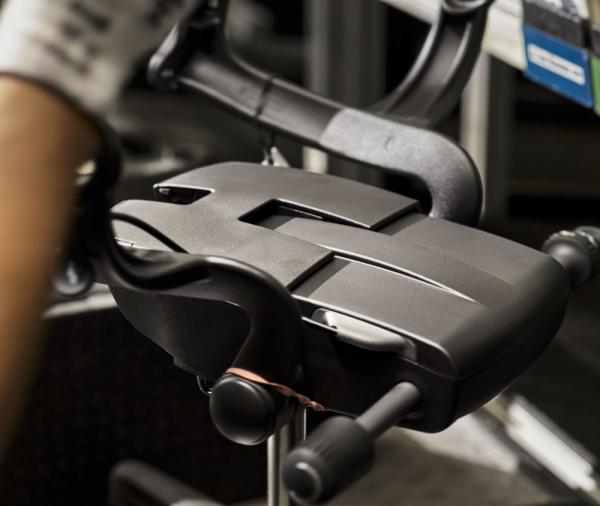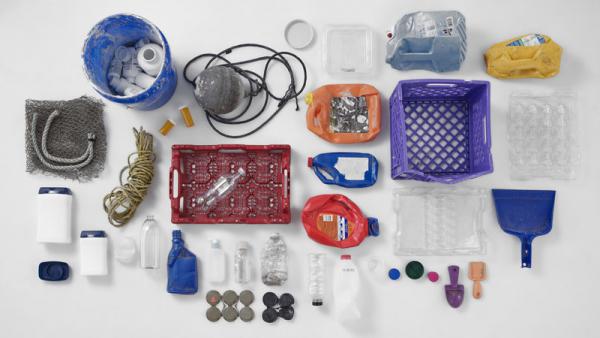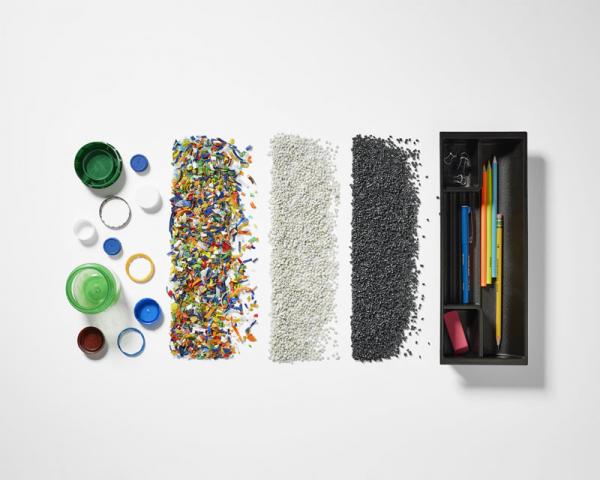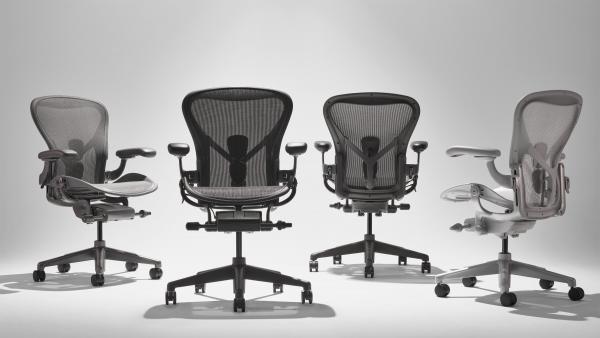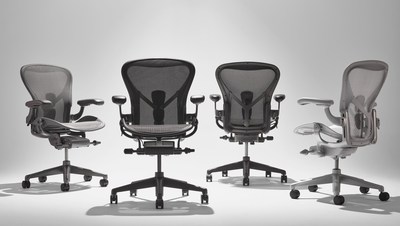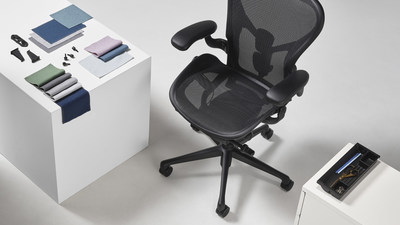The Aeron Chair Portfolio, including new colorway Onyx Ultra Matte, and other product and packaging solutions will incorporate mismanaged plastic waste found near waterways, as part of the company's goal to use 50% recycled content in all materials by 2030.
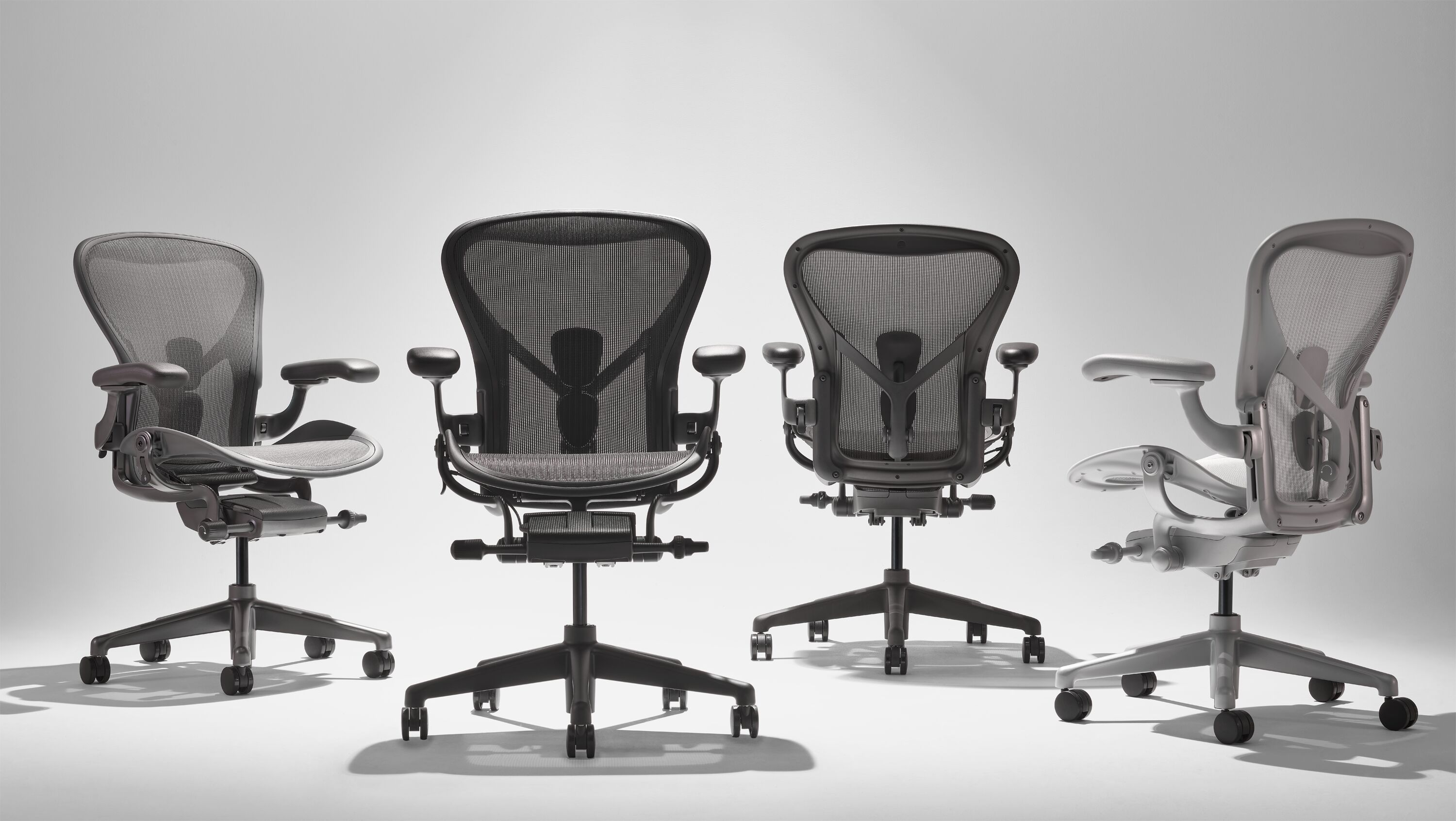
ZEELAND, Mich., Sept. 1, 2021 /PRNewswire/ -- Today, Herman Miller (NASDAQ;MLHR) announced that its entire portfolio of Aeron Chairs will contain ocean-bound plastic, including a new color, Onyx Ultra Matte, which contains up to 2.5 pounds (1.13 kg) of mismanaged plastic waste found near waterways per chair. These material changes in the Aeron Portfolio are projected to save the ocean from over 150 tons of plastic annually—equal to approximately 15 million single-use plastic water bottles1.
The updates are part of Herman Miller's membership in NextWave Plastics, its ongoing commitment to sustainability, and long-term goal to increase recycled content to at least 50 percent including the use of ocean-bound plastic across all material the company uses by 2030.
Aeron is the latest in a growing list of products Herman Miller has reengineered using ocean-bound plastic. The effort also includes parts of the recently launched OE1 Workplace Collection, the Sayl Chair in Europe, utility trays as part of pedestal units, and its latest textile collection, Revenio, which is made of 100 percent recycled materials and includes a biodegradable polyester. The company is also reducing its footprint by adding ocean-bound plastic to returnable shipping crates that send seating parts to and from suppliers and poly bags used to keep products safe during transit
"Every year, an estimated eight million tons of plastic enter the ocean. This is roughly equivalent to dumping a garbage truck full of plastic into the ocean every minute," said Gabe Wing, Herman Miller's Director of Sustainability. "We joined NextWave to play an active role in taking on the ocean plastic problem and cast a wide net for opportunities to incorporate ocean-bound plastic across our global operations. We're proud of the progress we've already made with packaging and textiles and are eager to continue doing our part in preventing harmful plastic from reaching our oceans by adding it to the iconic Aeron Chair."
By integrating ocean-bound plastic into all these products and packaging solutions, Herman Miller estimates it will divert up to 234 metric tons of plastic from the ocean annually, equal to preventing close to 400,000 milk jugs or up to 23 million plastic bottles from entering the ocean annually1.
Ocean-bound plastic is plastic material that has not yet found its way into the ocean and is classified as "mismanaged waste." This is plastic that is not being collected, is unlikely to be collected, and is found within 50 kilometers of a coastline. Common examples of ocean-bound plastic include plastic bottles, jugs, caps, and fishing gear.
When plastic waste builds up in coastal cities, suppliers work with local pickers to collect the plastic. Once collected, the material is ground, washed, and pelletized. From there, it is sold to manufacturers who test and re-engineer the plastic to incorporate into products.
"On our current trajectory we are at risk of tripling the rate of new plastic entering the ocean every year. A critical strategy to disrupt that path is to demonstrate the value of ocean-bound plastic. In bringing the Aeron Chair made with ocean-bound plastic to market, Herman Miller is not only proving the commercial value of the material, but showcasing the power of collective action in developing ocean-bound plastic supply chains," said Dune Ives, CEO of Lonely Whale. "Herman Miller, and all members of the NextWave Plastics consortium, are taking the necessary action - today - to make a positive impact for the ocean and for us all."
The plastic used in Aeron is currently sourced from India and Indonesia, which are two of many locations where Herman Miller and other NextWave member companies are creating demand and establishing a supply chain for this material. By sourcing ocean-bound plastic from these areas, the companies are making both economic and social impact by supporting local communities and employing individuals who make a living collecting mismanaged waste near the shoreline.
"We're doing more than making an environmental impact," said Bob Teasley, Director of Supply Management at Herman Miller. "By working with coastal communities around the world to harvest ocean-bound plastic, we're increasing demand, creating jobs, and boosting economies."
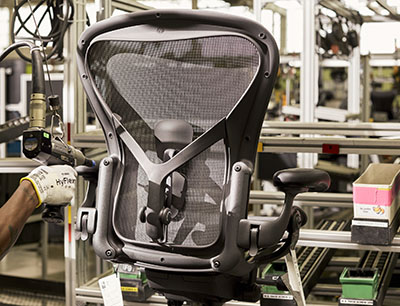
Making the best, better for Earth
We advanced the Aeron Chair, adding ocean-bound plastic to the body—all without compromising what makes it the best work chair on Earth.
Aeron's legacy of sustainability and innovation continues to evolve since its introduction nearly 30 years ago. Designed by Bill Stumpf and Don Chadwick in 1994 and remastered in 2016, it first proved pioneering in both ergonomics and material innovation, without relying on the standard use of foam, fabric, or leather found in most office chairs at the time.
The Aeron Chair is Herman Miller's top selling seating solution and has received a variety of awards and recognition including the Good Design Award (GDA) from the Chicago Athenaeum Museum of Architecture and Design, FIRA (Furniture Industry Research Association) award, the IDSA Designs of the Decade award, and is part of the permanent collection of MOMA. It was also the company's first product to receive the industry-leading Cradle to Cradle V3 Silver Level certification, assessed on environmental and social performance.
Depending on configuration, the ocean-bound plastic in Aeron can be found in the frame and tilt covers of the chair and contains between 0.5 and 2.5 pounds (226.8 g and 1.13 kg) of the material per chair, equivalent to approximately 23 to 114 plastic water bottles. The new Onyx Ultra Matte colorway contains the highest amount of ocean-bound plastic at almost 2.5 pounds (1.13 kg) per chair. All chairs within the Aeron Portfolio are up to 90 percent recyclable3 and composed of over 50 percent recycled content2.
Aeron is available in a palette of four material expressions centered on elements pulled from the Earth. Onyx is a dramatic ultra-black shade intended to modernize Aeron. Graphite is a distinctive dark gray, with a classic textured finish. Carbon offers a balanced neutral that works equally well in warm and cool environments. Mineral is the lightest and illuminates Aeron's finer points, ideal for open floorplans and spaces. Each component of the chair was thoughtfully designed, creating a fundamentally harmonious color palette.
Aeron's new Onyx Ultra Matte colorway will be available to order in North America starting in September 2021. All Aeron colors and configurations will be updated to contain ocean-bound plastic and will be available to order soon globally. Other use-cases with ocean-bound plastic including OE1, packaging, and the Revenio textile collection are in production now.
Related Links
hermanmiller.com/aeron
hermanmiller.com/sustainability
hermanmiller.com/ocean-bound-plastic
nextwaveplastics.org
Other Resources
Herman Miller Ocean-bound Plastic One-pager
1 Based on annual sales forecast
2 Based on top selling global model
3 Based on available recycling facilities
About Herman Miller
Herman Miller is a globally recognized leader in design. Since its inception in 1905, the company's innovative, problem-solving designs and furnishings have inspired the best in people wherever they live, work, learn, heal, and play. In 2018, Herman Miller created Herman Miller Group, a purposefully selected, complementary family of brands that includes Colebrook Bosson Saunders, DWR, Geiger, HAY, Maars Living Walls, Maharam, naughtone, and Nemschoff. Guided by a shared purpose—design for the good of humankind—Herman Miller Group shapes places that matter for customers while contributing to a more equitable and sustainable future for all. For more information visit www.hermanmiller.com/about-us.
About NextWave Plastics
NextWave Plastics is an industry-led, open-source collaboration among leading technology companies and consumer brands to develop the first global network of ocean-bound plastics supply chains. Convened by Lonely Whale, this consortium aims to keep plastic in our economy and out of the ocean and has committed to preventing 25,000 tons of plastic waste from entering the oceans by 2025 across countries most impacted by plastic pollution. Members include Dell Technologies, Bureo, CPI Card Group, Herman Miller, HP Inc, Humanscale, IKEA, Interface, Solgaard, and Trek Bicycle. In 2021, NextWave was awarded the top honors at the United Nations SDG Action Awards, which recognize organizations from around the world who are mobilizing, inspiring and connecting individuals to make positive change for people and the planet. To learn more, visit www.nextwaveplastics.org, follow along on Twitter at @NxtWavePlastics, or connect on LinkedIn.
SOURCE Herman Miller, Inc.

